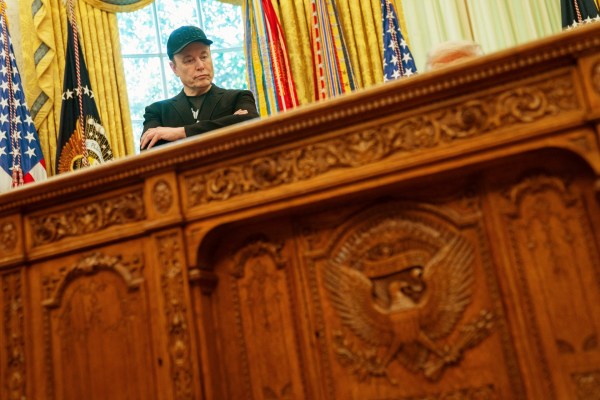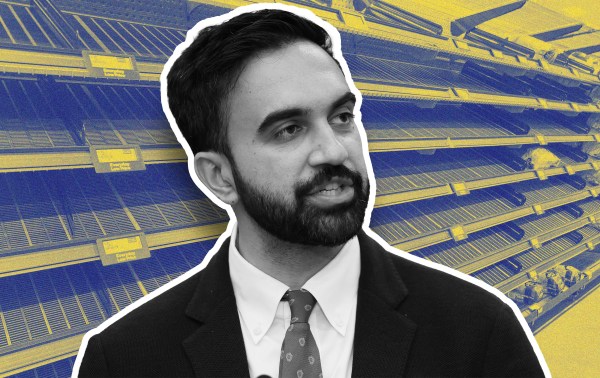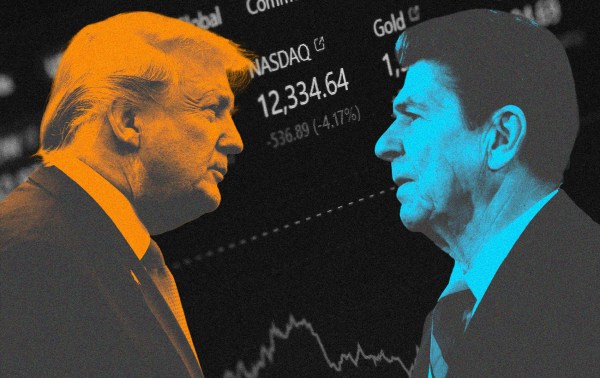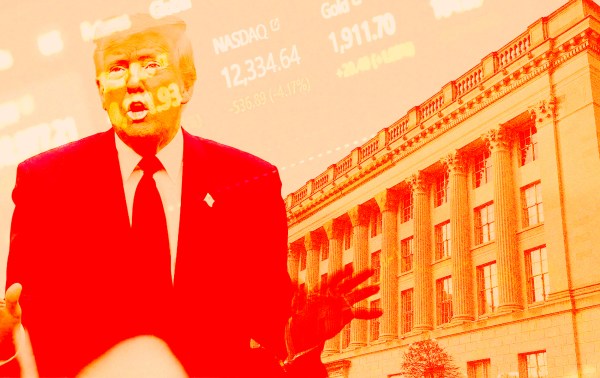This is the free version of The Morning Dispatch. To unlock the full version and start your day informed on the biggest stories impacting your world, become a Dispatch member.
Happy Thursday!* When the Washington Nationals fired both their longtime president of baseball operations and manager on Sunday, ownership cited the team’s need for “new energy.” On Wednesday night, the players debuted a new home run celebration: an Uncle Sam hat with a stars-and-stripes jacket.
Depending on how this goes, The Dispatch softball team may or may not be debuting its own Uncle Sam getup soon.
Quick Hits: Today’s Top Stories
- Russia attacked 11 regions across Ukraine early Wednesday morning, unleashing 728 drones and 13 missiles in Moscow’s most powerful aerial assault since the war’s start. Drone debris killed one person in the western region of Khmelnytskyi, and two others were injured in strikes on Kyiv, according to local officials. The strikes came one day after President Donald Trump announced plans to send more weapons to Ukraine and signaled he would consider supporting legislation to further sanction Russia. Meanwhile, Ukrainian President Volodymyr Zelensky—who said Russia’s latest attack was “yet another proof of the need for sanctions”—met with the U.S. special envoy to Ukraine, Keith Kellogg, in Rome on Wednesday to discuss weapons supplies and prospective sanctions on Russia.
- The Houthis—an Iranian-backed, Yemen-based terrorist organization—sank a Liberian-flagged, Greek-owned cargo ship in the Red Sea on Wednesday morning, killing at least four crew members. European Union officials said six crew members were rescued after spending more than 24 hours in the water, and that 15 others are still missing. The U.S. Embassy in Yemen said Houthi rebels kidnapped many surviving crew members, which a Houthi spokesman described as a “rescue.” The spokesman also took responsibility for the attacks on Eternity C, which used drones, missiles, and rocket-propelled grenades. The maritime assault marked the second such attack in recent days, after the Houthis struck and sank another ship, Magic Seas, on Sunday.
- The Israeli military announced Wednesday that its forces had conducted on-the-ground operations in southern Lebanon to prevent Hezbollah from reconstituting in the region. Israeli intelligence confirming the location of Hezbollah sites in southern Lebanon prompted the operation, which the Israel Defense Forces said targeted the Iranian-backed group’s “weapons and terrorist infrastructure,” including firing positions and an underground structure storing weapons and explosives. The raids marked Israel’s first ground maneuver into southern Lebanon in months, as a November 2024 ceasefire continues to hold.
- In a letter addressed to Brazilian President Luiz Inácio Lula da Silva on Wednesday, Trump said he would impose a 50 percent tariff on “any and all” Brazilian products delivered to the United States, citing the ongoing trial facing Brazil’s former president, Jair Bolsonaro. Trump said that Bolsonaro, who is charged with plotting an illegal scheme after losing Brazil’s 2022 election, was the victim of a “Witch Hunt,” and that the trial should “not be taking place.” Responding to the threatened duties, Brazil’s president defended his country’s judicial system and said the U.S. would face reciprocal measures if it moves forward with the raised rates.
- The Department of Justice on Wednesday sued the California Department of Education and the California Interscholastic Federation, an independent nonprofit governing high school sports in the state, accusing both of violating Title IX civil rights law by permitting transgender women and girls to compete on female sports teams. “These discriminatory policies and practices ignore undeniable biological differences between boys and girls, in favor of an amorphous ‘gender identity,’” the DOJ’s lawsuit stated, adding that the policy harms female student athletes. California Gov. Gavin Newsom’s office pushed back on the suit, arguing, “No court has adopted the interpretation of Title IX that is being advanced by the federal government.”
- The Trump administration applied further pressure to Harvard University in a series of moves on Wednesday. Separately, both the Education Department and Department of Health and Human Services sent notice to the New England Commission of Higher Education—a nonprofit accrediting organization—that the university may be violating accreditation standards and federal law. Meanwhile, the Homeland Security Department (DHS) issued administrative subpoenas to Harvard for access to its records of international students. In response, the university denied that any of its actions violated accreditation standards or federal law, and said the DHS subpoenas were “unwarranted.”
‘A Little Poorer and a Little Worse Off’

We don’t like to jump to conclusions here at TMD, but we’re starting to think President Donald Trump really likes tariffs. The White House announced a slew of new levies this week at levels similar to his April “Liberation Day” tariffs. Barring trade agreements, the new rates are set to take effect August 1—an extension of the previous July 9 deadline. Trump also unveiled additional sector tariffs, including a 50 percent tax on imported copper.
Whether the tariffs will actually take effect on August 1—and how they will shake up the economy—remains to be seen. But, even before this latest tariff salvo, the Trump administration’s first six months have already had significant economic ramifications. Just ask the White House, which is celebrating what it called “another stellar month” for the U.S. economy.
But a true assessment of the overall U.S. economy is harder to get. Some indicators point to positive trends: Job numbers are strong, the stock market is near record highs, and inflation remains manageable. The economy seems to have weathered the Trump administration’s tariffs so far, and the recession some insisted was around the corner has yet to materialize. But other signs—like a declining dollar and shrinking GDP—could portend future economic trouble, especially in light of more tariffs.
If Trump’s trade policy does bring on a recession, it’s too soon to see it yet. “What everyone has forgotten is how recessions normally work,” Justin Wolfers, a professor of public policy and economics at the University of Michigan, told TMD. “The idea that a guy gets elected in November, takes power in late January, and we should be looking for things to have gone ‘crack’ by May or June just doesn’t fit with the traditional history of recessions.” So far, the economy has remained relatively steady, alleviating much of the panic from April, when 60 percent of CEOs said a recession was nigh. By June, that number decreased to less than 30 percent.
Despite the climate of uncertainty created by Trump’s volatile trade policy, the economy is in a similar position to where it was a few months ago. “The tariff numbers have changed, but the overall situation is really the same,” Scott Lincicome, the author of our Capitolism newsletter, told TMD. “There are a couple realities that I think everybody loses when they talk about tariffs and the economy and just the U.S. economy generally these days. The first is that the U.S. economy is massive—$30 trillion economy. It is also very dynamic.”
Because the U.S. has a flexible, service-based economy, it can withstand much of the pressure from tariffs. “You put that all together, and there’s simply no reason to expect a Great Depression because of Trump’s tariffs,” Lincicome added. “The other big thing is that tariffs take a while to work their way through the various channels.”
Businesses have been flexible enough to avoid the drastic price increases feared after the announcement of the “Liberation Day” levies earlier this year. But how long companies can stave off price hikes is unclear. In preparation for the trade restrictions, some businesses increased inventory imports and reconfigured supply chains, while others took more creative routes to absorb the tariff costs, like ending free shipping.
A large swath of businesses, though, say they are already taking a direct hit to their profit margin. According to a KPMG survey released Tuesday, 57 percent of companies reported a decrease in their gross margins, with 25 percent reporting drops of more than 6 percent. In what may be the most telling finding, 77 percent of businesses surveyed said they were considering raising prices at least 5 percent in the next six months.
Surveys like these—what economists call “soft data”—have shown that businesses are, as Wolfers put it, “miserable on every measure.” Surveys of executives have shown declines in overall optimism, plans to increase prices, and expectations of declining growth—all bad signs for the economy. Consumer sentiment is down, as well, dropping 18 percent from December 2024, according to Michigan’s Index of Consumer Sentiment. Similar precipitous drops have indicated a coming recession in the past.
But the “hard data” is actually quite positive. American employers added 147,000 jobs in June, significantly higher than economists’ 110,000 estimate, and the unemployment rate fell to 4.1 percent—its lowest level since February. Inflation has remained steady, as well, clocking in at 2.4 percent in May and even posting declines in categories expected to see tariff-related increases, like apparel prices. The stock market—a helpful sign of investor sentiment—continued to rise even as new Trump tariffs were announced. “As much as the soft data looks miserable, the hard data tells a much more optimistic story,” Wolfers said.
So why the disparity? “Surveys are forward-looking, and the hard data are backward-looking, so there’s always a lag,” Lincicome said. “Either, business owners are just lying to the surveyors—I very much doubt that—or, there is going to be some pain on the horizon.”
Additionally, the hard data is more complex than it looks at first glance. The employment market in June added the vast majority of its jobs in the state government and health care industries. “Employment growth outside of those marquee industries has been anemic at best, and the duration of unemployment for the typical unemployed worker seeking a job continues to creep up,” Cory Stahle, an economist at Indeed Hiring Lab, wrote about the June jobs report. “This is not a bad report, but it might not be as solid as it seems on the surface.”
Other metrics are not positive at all. First-quarter GDP growth dropped at a 0.5 percent annualized rate, revised down in late June from its previous reported level of 0.2 percent. Consumer spending is also down, including a 50 percent drop in car buying in May.
But the indicators are still difficult to interpret. “The tariff shock is enormous. I’m not saying that in the sense of, it will speed up or slow the economy. I’m saying that in the sense that it will distort people’s behavior,” Wolfers said. “A lot of the spending that happened in the second quarter happened in the first quarter.” This distortion affects not just first-quarter growth, but also second-quarter growth. And as the tariffs continue to stop and start, spending in later quarters may be affected, as well.
All of this makes it difficult to draw broad conclusions about the overall economy. “To a greater extent than I can remember in years and years, we are in thick fog,” Wolfers added.
The stock market, on the other hand, is clearly signaling investor confidence. The S&P 500 hit an all-time high on July 3, despite being only days away from Trump’s July 9 tariff pause deadline. The Nasdaq composite, meanwhile, closed at a record high on Wednesday. Part of the reason for the optimism is investors shifting their expectations about U.S. trade policy. “To Trump’s great credit, whether intentional or not, he has moved the Overton window way into tariff crazytown, so that now a trade deal with Vietnam that puts tariffs at 20 percent, which is terrible, is celebrated by the market because he threatened 45 percent,” Lincicome said. “Does that mean that the policies are ‘working’? No. It just means that investors are not, right at the moment at least, fearful of the worst.”
At the same time, the value of the U.S. dollar had its worst start to a year since 1973. When compared against other currencies, the dollar’s value dropped more than 7 percent in six months, and analysts predict that it could decline another 10 percent before the end of the year. Because of both Trump’s trade policies and rising debt, investors have become less confident in the U.S. as a safe haven for investment. A weaker dollar gives exporters a price advantage, but it makes imports more expensive, exacerbating the effect of the Trump tariffs on consumers and weakening purchasing power.
“People just don’t see the United States being the main growth engine for the world, and I think some people are fearful of holding dollars these days,” Lincicome said. “Treasuries are better, they’ve had a couple good auctions and yields are down a bit, but they’re not great.” Foreign direct investment into the U.S. declined precipitously in the first quarter of the year.
If the tariffs eventually work their way through the economy and spark economic pain, it might not be as bad as a full-blown recession, but it still could be noticeable. “It is really hard to say where the actual, exact number is. It’s safer to say that it will be slower growth, and higher inflation, and lower employment than what it would have been otherwise, and by a measurable, important degree,” Lincicome said. Before Trump’s latest tariffs were factored in, analysts estimated that GDP could decline by 0.8 percent, and inflation is expected to hover around 3 percent by the end of the year.
“Now, these are not disastrous things,” Lincicome said. “But it just means we’re a little poorer and a little worse off.”
Today’s Must-Read

Mixed Signals From the U.S. to Ukraine Are a Deadly Mistake
Toeing the Company Line

You’re Not the Chosen One


State-Run Supermarkets: A (Bad) Statist Solution in Search of a Problem

Children Are Not a Harm to Reduce

The Big Beautiful Bill’s Murky Border Security Spending

Does Zohran Mamdani Have a 9/11 Problem?

Assessing Claims About Cuts to NOAA and NWS in the Wake of Texas Flooding


Worth Your Time
- As students increasingly outsource writing to artificial intelligence, the consequences may extend well beyond academic integrity. Writing for Engelsberg Ideas, Aaron MacLean argued that AI poses an urgent and profound danger to human reasoning. “An old professor of mine, in my freshman year, once said something wise and important to a seminar I was in when one of my classmates observed that ‘I know what I think, I just can’t get the words down on the page.’ My teacher responded: ‘Well, you don’t actually know what you think, then. The act of writing the thing is the same thing as the thinking of it. If you can’t write it, you haven’t actually thought it,’” he wrote. “Now we have technology that, in essence, is promising to supplant the core and foundational human activity – that of thinking. And if it is a bit sad that human beings are simply less musical than we used to be, this threat is much more serious. Freedom is, in the first and most essential place, intellectual freedom – the ability to reason clearly, to navigate received opinion and accreted prejudice so as to pursue and sometimes even catch knowledge of things that matter. This activity, when directed at the things that matter most, is called philosophy. It’s a kind of hunt, sometimes pursued in cooperation with others, racing in bands across the limitless plain after our quarry – but in the moment of the kill, we all must kill alone, for ourselves. The hunt for wisdom requires, of course, basic reasoning skills and ideally wide exposure to high-quality efforts of others to reason about things that matter. It requires learning.”
- Do Americans need to party more? Writing in his Substack, Derek Thompson explained why the question matters more than you might think. “In January, The Atlantic‘s Ellen Cushing published an essay with an admirably blunt title: ‘Americans Need to Party More.’ Burrowing into the appendix tables of the American Time Use Survey, she unearthed the fact that just 4.1 percent of Americans said they ‘attended or hosted’ a party or ceremony on a typical weekend or holiday in 2023. In other words, in any given weekend, just one in 25 US households had plans to attend a social event.” Thompson wrote. “Between 2003 and 2024, the amount of time that Americans spent attending or hosting a social event declined by 50 percent. Almost every age group cut their party time in half in the last two decades. For young people, the decline was even worse. Last year, Americans aged 15-to-24 spent 70 percent less time attending or hosting parties than they did in 2003. … Practically every measure of social togetherness was walloped by [Bowling Alone author Robert] Putnam’s account, including church attendance, labor union participation, and, yes, bowling leagues. Despite some critics who insist that every social phenomenon is a story about class, Putnam showed that these trends affected rich and poor alike. Whatever is happening, he said, it’s happening to just about all of us.”
Presented Without Comment
CNN: Trump Said He Threatened To Bomb Moscow if Putin Attacked Ukraine, 2024 Fundraiser Tapes Show
“With Putin I said, ‘If you go into Ukraine, I’m going to bomb the sh*t out of Moscow. I’m telling you I have no choice,’” Trump said during one 2024 fundraiser, according to the audio. “And then [Putin] goes, like, ‘I don’t believe you.’ But he believed me 10%.”
Trump later claimed he relayed a similar warning to Chinese President Xi Jinping over a potential invasion of Taiwan, telling him that the US would bomb Beijing in response.
Also Presented Without Comment
Politico: Turkey Bans Elon Musk’s Grok Over [President Recep Tayyip] Erdoğan Insults
In the Zeitgeist
Folk singer and songwriter Arlo Guthrie, best known for his satirical work, turns 78 years old today. One of his greatest songs, “Alice’s Restaurant Massacree,” is an 18-minute tale of a Thanksgiving dinner gone awry and a stark warning about illegal dumping.
Let Us Know
Do you share Aaron MacLean’s concerns that AI poses a threat to human reasoning?
Correction, July 10, 2025: This newsletter has been updated to reflect that today is Thursday.












Please note that we at The Dispatch hold ourselves, our work, and our commenters to a higher standard than other places on the internet. We welcome comments that foster genuine debate or discussion—including comments critical of us or our work—but responses that include ad hominem attacks on fellow Dispatch members or are intended to stoke fear and anger may be moderated.
With your membership, you only have the ability to comment on The Morning Dispatch articles. Consider upgrading to join the conversation everywhere.